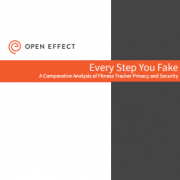Most websites can’t protect their readers unless they dump insecure ad trackers.
January 28, 2015 – Google Chrome users have a new way to learn about how they are being tracked online. TrackerSSL is a browser extension that shows the number of trackers, and ones that are tracking securely, for each web page users visit.
TrackerSSL was developed by Andrew Hilts, executive director of Open Effect, a non-profit digital research organization. Mr. Hilts, also a research fellow at the Citizen Lab at the University of Toronto’s Munk School of Global Affairs, completed the tool with assistance from teammates at a New York hackathon.
Revelations by former NSA contractor Edward Snowden describing mass internet surveillance motivated Hilts to create TrackerSSL. NSA programs like MARINA and SPINALTAP rely on capturing, and analyzing, insecure tracker information to develop detailed profiles about individuals and who they associate with.
“Websites have a responsibility to secure their readers from surveillance by implementing HTTPS technology, which encrypts data between a website and its readers. HTTPS prevents snoops and spies alike from knowing what’s being communicated between websites and their readers,” says Hilts.
Many sites have not adopted HTTPS because they rely on insecure ad trackers for revenue. So even if websites want to protect their readers their advertisers may not care. For HTTPS to be effective, every single party transmitting data on a web page needs to implement the basic security protocol.
“TrackerSSL lets people know how many insecure advertising trackers are responsible for blocking a site from protecting its readers.” Hilts continues, “Once people know who’s responsible for the poor security they can take to Twitter and let sites know they care about security and call for the site to improve the protections it providers to readers. Hopefully these Tweets will put positive pressure on major websites to implement HTTPS.”
Install TrackerSSL from the Google Chrome store today.
About Open Effect
Open Effect is a Canadian not-for-profit that develops and advocates for the ethical and accountable treatment of personal data. Its activities include applied research and development of prototype tools, comparative analyses of digital services, and educational material that empower people to access, understand, and benefit from their personal information.
About The Citizen Lab
The Citizen Lab is an interdisciplinary laboratory based at the Munk School of Global Affairs, University of Toronto, Canada focusing on advanced research and development at the intersection of Information and Communication Technologies (ICTs), human rights, and global security.
Andrew Hilts
Executive Director, Open Effect
Research Fellow, Citizen Lab
1-416-946-8903
[email protected]

 Request access to your personal data with our simple tool
Request access to your personal data with our simple tool


